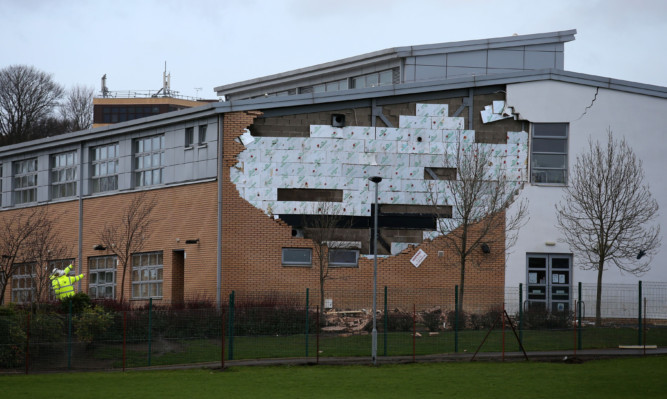The closure of 17 Edinburgh schools over safety fears has prompted calls for a review of all public private partnership (PPP) contracts in Scotland as 7,000 pupils were left unable to return to the classroom.
Students were expected back on Monday after the Easter holidays but the decision to shut the schools was made amid concerns about the standard of construction in buildings.
The 10 primaries, five secondaries and two additional support needs schools will now remain closed while detailed structural surveys take place.
They were all built under the same PPP contract.
Scotland’s largest teaching union, the Educational Institute of Scotland (EIS), has called for a review of all PPP contracts in Scotland and the Scottish Secondary Teachers’ Association (SSTA) questioned “the cost to our children” of such deals.
Meanwhile, the Scottish Trade Unionist and Socialist Coalition (TUSC) demanded the termination of all PPP contracts.
It comes after workers repairing serious structural issues at one city primary found “further serious defects” within the building on Friday.
Edinburgh Schools Partnership (ESP), which operates the schools, could not provide safety assurances and the local authority made the decision to shut them from Monday.
Scottish Government officials have asked all councils across Scotland to conduct “any necessary checks” on their own buildings following the closure decision and First Minister Nicola Sturgeon chaired an emergency meeting of the Government’s resilience committee over the weekend.
Education Secretary Angela Constance has described the situation as “deeply concerning”.
The Scottish Parliament – where daily business is currently suspended ahead of next month’s Holyrood election – has offered to help the council accommodate any displaced pupils.
A statement on Edinburgh City Council’s website said the surveys are focusing on secondary schools as a priority as pupils prepare for exams in the next few weeks.
It said officials hope to have a “clear picture” on the affected secondary schools – Gracemount, Craigmount, Firrhill, Drummond and Royal High – by Tuesday, including about alternative arrangements.
Seamus Searson, SSTA general secretary, said: “For young people due to start sitting national exams in a matter of days, the timing could hardly be worse.
“Edinburgh City Council and the building contractors have known about these structural problems since walls started collapsing in January, yet it is only now that proper inspections are taking place.
“Pupil and staff safety is paramount, but youngsters’ life chances are also top priority.”
Euan Duncan, SSTA president, said: “It’s incredible that these fairly new buildings may not be fit for teaching.
“This is an example of how putting profit before pupils damages education. PPP schools cost taxpayers a fortune, and now we must ask what will be the cost to our children.”
Edinburgh City Council leader Andrew Burns said it had no option but to close the schools.
He said: “Clearly we have every right to expect these schools to have been built to a good standard and in accordance with industry practice. We now know this isn’t the case.”
EIS general secretary Larry Flanagan said that while he welcomes the safety of pupils and staff being treated as a priority, there are questions over “how such significant defaults could escape normal building control scrutiny”.
Brian Smith of Scottish TUSC said it is calling for all PPP projects to be terminated through a combination of renegotiation and the “buying out of these contracts with minimal compensation”.
Other local authorities across Scotland have said they have carried out, or are carrying out, safety checks.
A Scottish Government spokeswoman said: “Every child should feel safe at school and in their community and local authorities have a statutory responsibility to maintain their schools to a safe and sufficient standard.
“Education Scotland inspects the standards and quality in education. Inspections into the quality and construction of school buildings must be carried out by local authorities and technical specialists. National guidance is provided to assist local authorities in assessing the condition of their school estate.
“Although Education Scotland does not inspect the structural aspects of a school, if it becomes aware of a health and safety issue during an inspection it follows up the issue with the school and the local authority to ensure it is addressed.
“The Scottish Government has offered its full support to City of Edinburgh Council to keep disruption to children’s education at an absolute minimum and has written to all local authorities to ask them to carry out any necessary checks on their own estate as soon as possible.”
